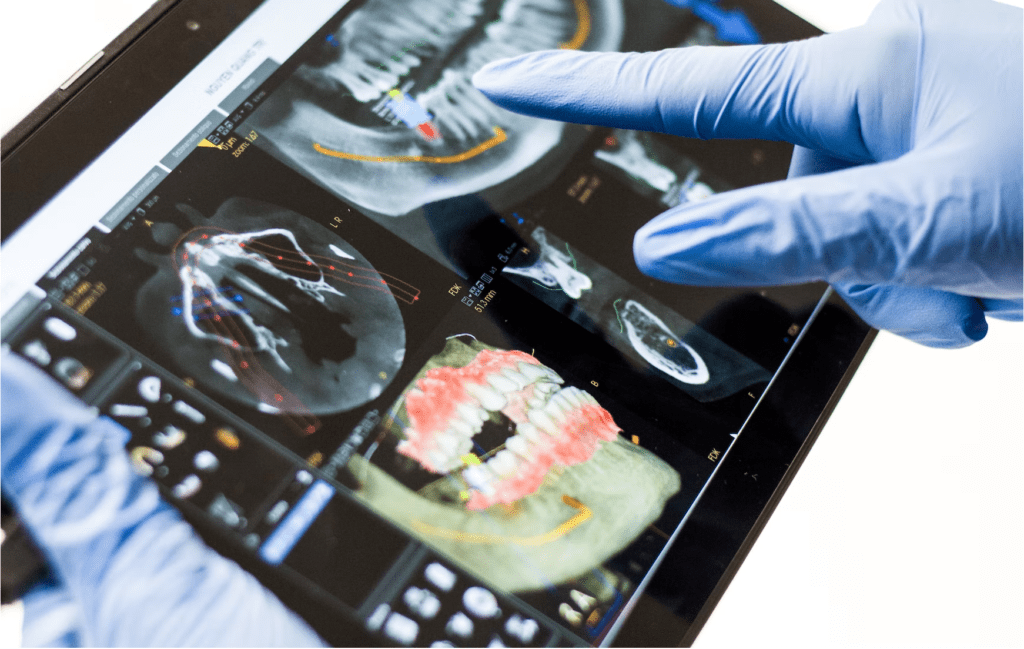Experiencing prolonged issues with your mouth and teeth may be a sign that oral or maxillofacial surgery needs to be performed. While oral surgery may seem like a daunting medical process, the initial discomfort is outweighed by the advantages of optimal oral health and functionality. We take a look at the different types of oral surgery as well as what to look for when considering an oral surgeon and oral surgery center.
What Is Oral Surgery?
Oral surgery is a generalized term for any surgical procedure carried out in or around the mouth, such as on the teeth, gums, jaw, or other oral and facial structures. Oral surgery involves the diagnosis and surgical treatment of injuries and defects of both the soft and hard tissues of the mouth. Trained dental specialists usually carry out an extensive range of procedures, which include teeth extractions, corrective jaw surgery, dental bone grafts, wisdom teeth removal, and more. Oral and maxillofacial surgeons are also legally licensed for reconstructive facial surgery, facial trauma surgery, and cosmetic surgery.
What Are the Common Types of Oral Surgery?
An increasing number of oral surgical procedures are performed annually. These are some of the most common types of oral surgery.
- Tooth extraction: Tooth extraction or tooth removal is the most common type of tooth surgery. Oral surgeons carry out tooth extraction by making an incision in the patient’s gums for better access to remove the tooth.
- Dental implant installation: Dental implant installation is a reliable and long-lasting method of replacing missing teeth. Medical-grade titanium or zirconia posts are inserted into the jaw, and teeth are restored via dental crowns, bridges or dentures after recovery.
- Dental bone grafting: When significant bone loss has occurred in the jaw, oral surgeons may need to perform dental bone grafting. Implants are fused to the jaw and subsequently topped with an artificial tooth to restore its original appearance.
Why Would Someone Need Oral Surgery?
Oral surgery may be recommended for patients when other treatment options have already been used or if their issues cannot be managed via general dentistry expertise. There are specific situations where oral and maxillofacial surgery will be recommended by dentists.
One instance is if a patient has impacted teeth. This usually happens to the wisdom teeth, but other teeth may simply emerge from the gums due to a lack of space in the jaw. Crowded teeth may lead to sore gums and tissue infection, and this condition could lead to permanent damage to surrounding teeth and bone.
Another case is if a patient has an observable underbite or overbite. Doctors may recommend orthognathic surgery as excessive underbites or overbites can cause problems with speaking, chewing, swallowing, and breathing.
What Is Recovery Like After Oral Surgery?
The duration of time needed for oral surgery recovery depends on the individual person as well as the type of surgical procedure performed. However, most patients are able to return to work or school after three days, and oral pain and discomfort generally subside after one week. During this healing period, medications are often prescribed to patients to increase comfort and speed up recovery.
Patient adherence to instructed recovery processes are crucial for successful results. Alcohol and cigarettes must be avoided by patients during the healing process, as these can slow down recovery. Pain caused by inflammation can be treated with a simple ice pack, and a salt water rinse can be performed every few hours to fight off bacteria. Crunchy foods like cereal and chips must also be avoided immediately after oral surgery to promote healing.
What To Look for in an Oral Surgeon and/or Oral Surgery Center
There are several factors to consider when choosing an oral surgeon or oral surgery facility. Surgeons must have credentials denoting proper education and training from an accredited dental school. For example, surgeons with about six years of surgical and anesthesia training show a reliable capacity to carry out successful oral surgery. One should also determine whether a potential surgery center has had multiple years of positive experience. Ensure that the website of an oral surgery center demonstrates specialization in a wide array of oral surgical procedures. Finally, oral surgery centers must have transparent financial options when it comes to accepting payments for treatments.
Final Words
The field of oral and maxillofacial surgery encompasses a vast set of surgical techniques geared toward maintaining the appearance and functionality of a healthy mouth. At Green Valley Oral Surgery & Dental Implant Center, we aim to solve any oral health problems you might be experiencing. Contact us to determine your options and restore beaming confidence in your smile.
